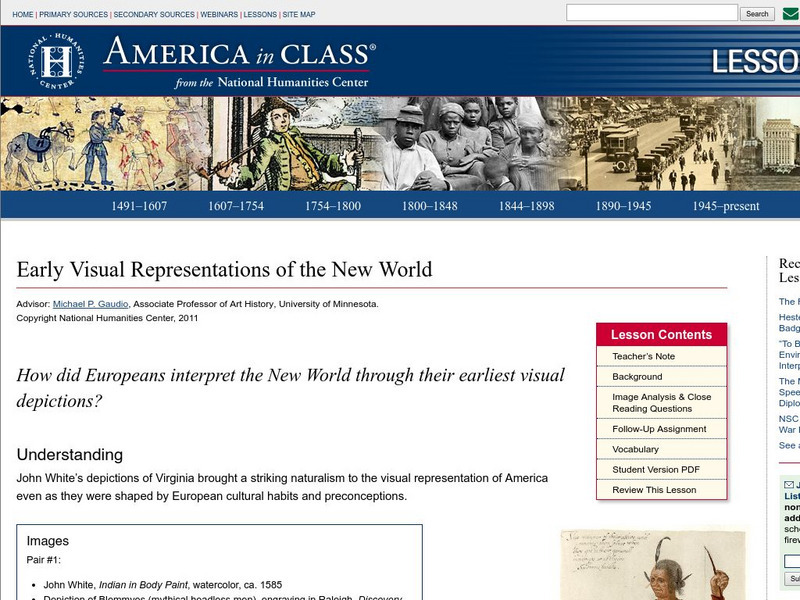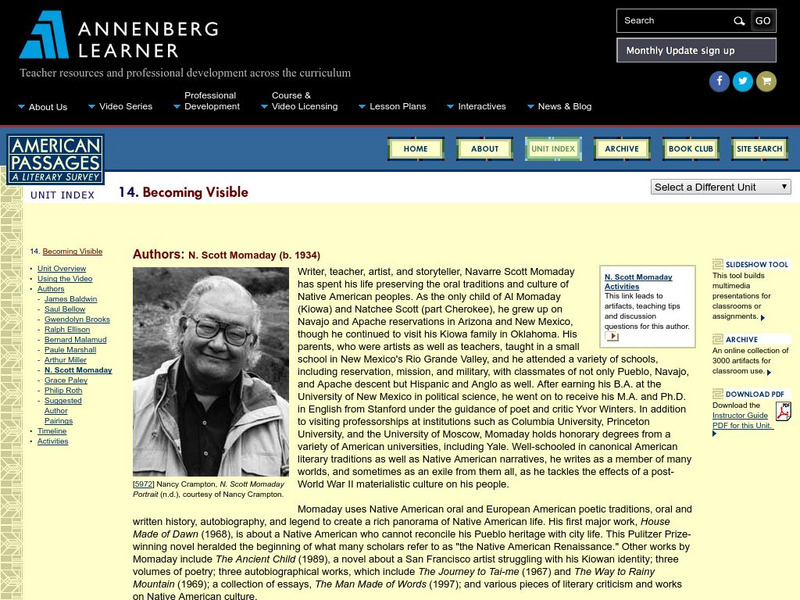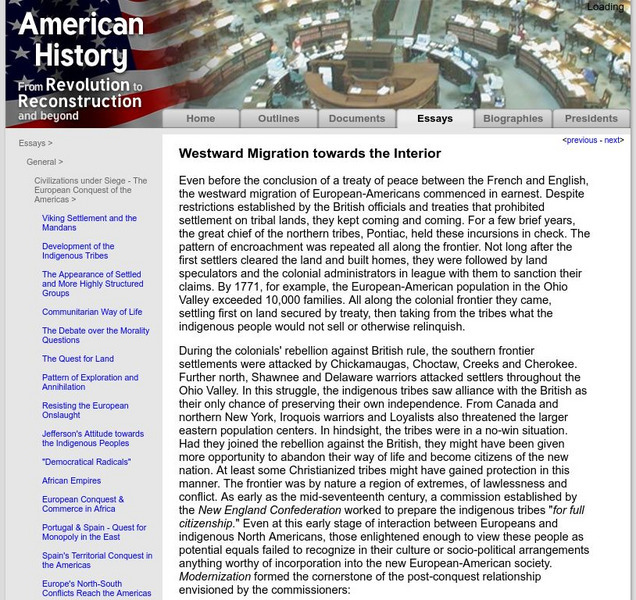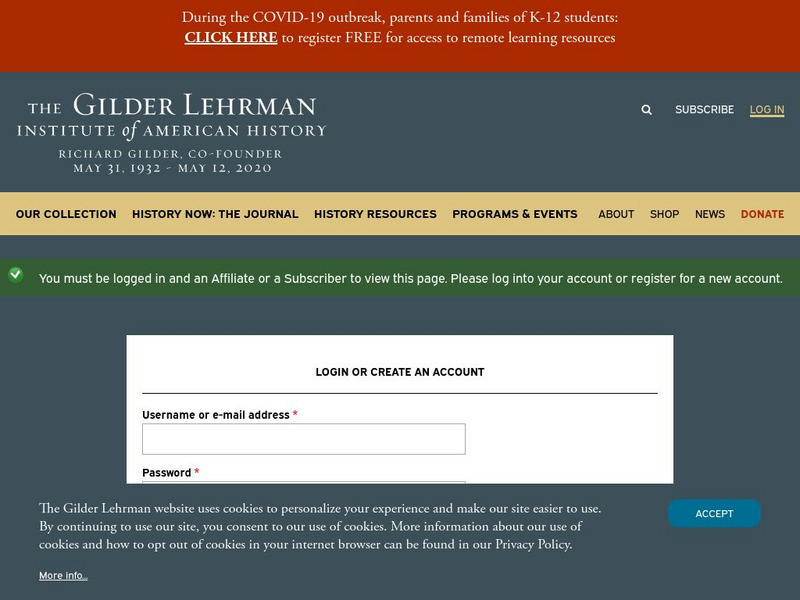Other
U.s. History Images: Native American Tribes
Published images from the mid-1800s to the early part of the 1900s depicting Native Americans from tribes all over the United States.
National Humanities Center
National Humanities Center: America in Class: Early Visual Representations of the New World
A lesson that examines how Native Americans were portrayed by artists in the sixteenth century, whose aim was to convey their appearance to a European audience, and thereby encourage investment in future New World explorations. By...
Other
Colonial America: Native American Cultures
A brief look at the Native American cultures before Contact and some discussion of the interaction with Europeans after Columbus. From an on-line American History textbook.
Digital History
Digital History: The Fate of Native Americans
A brief look at the inability of Native Americans to halt the settlement of their lands by American colonists after the French and Indian War. There is a short description of Chief Pontiac and his alliance of several tribes which fought...
A&E Television
History.com: Colonists at the First Thanksgiving Were Mostly Men Because Women Had Perished
According to this account (elements of which continue to be debated by historians, especially regarding the presence and role of Native Americans), the historic event didn't happen on the fourth Thursday in November, as it does today,...
Idaho State University
Imnh: Southeastern Idaho Native American Prehistory & History
Site presents detailed account of the history of the first Native American groups, Shoshone and Bannock tribes, located in southeastern Idaho.
Other
Victoriana Magazine: Native American Tribes and u.s Government
The U.S. government's policies towards Native Americans in the second half of the nineteenth century were influenced by the desire to expand westward into territories occupied by these Native American tribes. By the 1850s nearly all...
Curated OER
History Matters: John Collier Promises to Reform Indian Policy
Find the report by John Collier, Commissioner of Indian Affairs, to the Secretary of the Interior, describing how he was trying to right many of the wrongs in the federal government's dealings with Native Americans as a result of the...
Curated OER
National Park Service: Five Views: A History of American Indians in California
A history of five tribes in the California Native American culture area.
Other
Utah History to Go: American Indians
Online course material on southwest cultures specific to the state of Utah. Lesson contains questions and concepts for students and links to corresponding information. Students can link to articles, exhibits, historical photographs and...
Other
State of Rhode Island: Early History of Rhode Island
Starting with the Native Americans, this site tells of Rhode Island's history. Includes brief biography of Roger Williams and the part he played in the founding of the state.
Annenberg Foundation
Annenberg Learner: American Passages: Becoming Visible: N. Scott Momaday
Relying on many elements, including traditional Native American and European American traditions, this biography features the rich literary contributions of N. Scott Momaday. See "N.Scott Momaday Activities" for more resources.
University of Groningen
American History: Essays: Western Migration Towards the Interior
This resource provides an essay discussing the migration of American colonists into the Ohio River Valley and the impact on the Native Americans living in the area.
Ohio State University
Osu History Teaching Institute: Native American History: John Smith and the Powhatan
This lesson relates to understanding primary sources to evaluate John Smith's description of the Powhatan Indians.
Rutherford B. Hayes Presidential Library & Museum
United States Indian Policy During the Late 19th Century: Change and Continuity
By the 1890's, the status of Indian people seemed to validate Frederick Jackson Turner's claim that "the frontier has gone, and with its going has closed the first period of American history." Natives ceased to threaten the Republic...
A&E Television
History.com: The Native American Chief Who Drove Out Spanish Colonists and Nearly Expelled the English
In the summer of 1561, Spanish explorers abducted Opechancanough, a Powhatan Indian youth from the Chesapeake Bay tidewater region and brought him to the royal court of Spain. The kidnapping set off a chain of events that would alter the...
PBS
Pbs New Perspectives on the West: Pope
This site contains information about the religious leader from San Juan Pueblo, in present-day New Mexico. Pope organized and led the most successful Indian uprising in the history of the American West. He created the conditions for a...
Other
Texas Beyond History: Life and Times of the Caddo
This site is really a gateway for a number of other sites about the Caddo tribes. There is a site that introduces the Caddo, telling who they are, about their homeland, and the like. An interactive map traces the Caddo homeland. Caddo...
University of California
History Project: The Removal of the Cherokee Nation
Middle school lesson plan attempts to answer the question of the government's Indian policy and its relationship to the Cherokee. Young scholars will use sections from 26 primary source documents to aid in the research.
University of California
University of California: Robert B. Honeyman Jr. Collection
This collection at the University of California-Berkeley can now be accessed online through the Online Archive of California. It provides a vast collection of historically significant primary source images of early California and the...
Virginia Historical Society
Virginia Museum of History and Culture: Early Images of Virginia Indians
A collection of images of early Virginia Indians that includes information on interpreting the images and shows fanciful images that were not historically accurate.
Gilder Lehrman Institute of American History
Gilder Lehrman Institute: History Now: The Pueblo Revolt
[Free Registration/Login Required] Read an essay about the Pueblo Revolt of 1680 and find out why the Southwest Native Americans rebelled against the Spanish, and were successful in keeping the Spanish out of their pueblos for only...
OpenStax
Open Stax: The Loss of American Indian Life and Culture
Read this section from a chapter on "Westward Expansion" to learn about the methods that the U.S. government used to address the "Indian threat" during the settlement of the West and explain the process of "Americanization" as it applied...
Curated OER
History Matters: A Bill of Rights for the Indians
In an attempt to redress wrongs towards Native Americans in the Dawes Act of 1887, John Collier, Roosevelt's Commissioner of Indian Affairs, collaborated with Native American elders in order to come up with new laws. Read about what was...

















